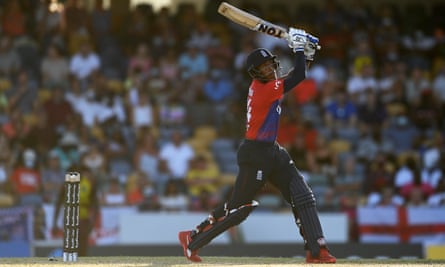England will travel to the Caribbean for their T20 World Cup defence in June without an anchor aboard ship, their team director, Rob Key, instead confident that six-hitting power is the best way to approach a possible “slugfest”.
This much was clear from the 15‑man provisional squad named by Key on Tuesday; one that must atone for last year’s carbuncle of a 50-over World Cup campaign in India. It brings a return for Jofra Archer after his latest year-long injury ordeal, the best wishes of the nation very much behind him. But overall it is clearly designed to outgun opponents amid the rising tide of run-rates in Twenty20 cricket this year.
There is no accumulator in the side per se; no classical batter whose default is to hold an innings together and personally build a crescendo. Instead, as widely trailed, muscle ripples from the top three of Jos Buttler, Phil Salt and Will Jacks, through the middle order of Jonny Bairstow and Harry Brook, before three all-rounders in Liam Livingstone, Moeen Ali and Sam Curran. Ben Duckett, no slouch, is the spare man.
“There’s no doubt the mentality of T20 has pivoted even more towards aggression,” said Key. “All this stuff about going out there, having a look, trying to adapt … actually, there are a lot of players, particularly the young generation, who are just smacking it out of the park. They look like they’re not thinking about it as much as players in the past.”
It even informs one of the bowling picks. Chris Jordan, 35, is recalled in part due to his recent surge in form with the bat, having averaged 30.05 at a strike-rate of 160.53 in domestic short-form cricket since the start of last summer. Once another lower order hitter, Jamie Overton, hurt his back last week, Jordan’s ability to clear the rope – as well as willing death bowling and athletic fielding – nudged out Chris Woakes.
“The fact that [Jordan] can bowl at the death has always been something we look for,” said Key. “But his batting seems to have kicked on a bit this time. Having power is a big thing out in the Caribbean, so that’s why CJ has comfortably got in there.”
Key, it should be noted, was not oblivious to the fact the lurch in scoring rates during this year’s Indian Premier League owes plenty to the impact substitute rule. This add-on – allowing a player to be swapped out mid-match – has skewed the balance between bat and ball, lessening the need for all-rounders in a team’s XI. Crucially, however, it does not feature in the 20-team World Cup.

Equally, this push for a succession of ball-strikers was informed by England’s previous outing in the Caribbean last December, where short boundaries and the trade winds led to a record 120 sixes being ransacked during the five-match T20 series against West Indies. Bat deep on paper, Key said, and it will embolden an incendiary top five that features three recent IPL centurions in Buttler, Jacks and Bairstow.
“It was a slugfest, really,” said Key, reflecting on the lessons from last year’s tour. “Six after six, with both teams trading blows – it became apparent how much value you have to put on the power game. I think it’ll be that batting depth we want, because what it does is give a licence to the people before them. It allows you to go harder, sooner.”
England are clearly leaning into their strengths here, their bowlers often the undercard ever since Eoin Morgan expanded minds in white-ball cricket all those years ago. That said, Archer is a headline act in his own right, with a second XI game for Sussex in mid-May, plus the four-match T20 series against Pakistan that follows, clearly vital to proving the fast bowler’s fitness before departure.
“As always with Jofra, it’s fingers crossed until he’s playing,” said Key. “You’re waiting for something really good to happen – you don’t quite believe it until he’s there. I know it’s been a massive toll on him. [But] he’s one of those rare cricketers. When you look at the attributes you want for a bowler in international cricket, Jofra has all of them.”
after newsletter promotion
Those Pakistan fixtures at home also serve as England’s only warm-up cricket before meeting Scotland in their Group A opener in Barbados on 4 June. To that end, and having initially pondered flexibility, Key has decided all players currently at the IPL must return home and miss its playoff phase. There is only one logistical complication remaining, with Buttler’s wife, Louise, expecting their third child around this time.
Key was keen to stress it is not the end of the road for Woakes, more that Jordan’s batting and Reece Topley’s left-arm angle with the new ball were preferred. The 35-year-old will be among those placed on standby and clearly has a chance still to travel given that the chosen seamers – including Mark Wood – have patchy fitness records.
Rehan Ahmed will also be waiting for the call back at base, the teenager elbowed out of the final selection by the uncapped Tom Hartley. This call, said Key, was based on left-arm finger spin being a “point of difference” in the Caribbean (England do not play in the USA) and may come to the fore as the tournament progresses or surfaces tire.
This was the case in that series last year, England monstering 267 for 3 in Trinidad to set up a series decider, only to then be rolled for 132 on the same pitch by the slow left-arm pairing of Akeal Hosein and Gudakesh Motie. For all the talk of power and slugfests, England’s title defence may hinge on whether that particular lesson was learned.
